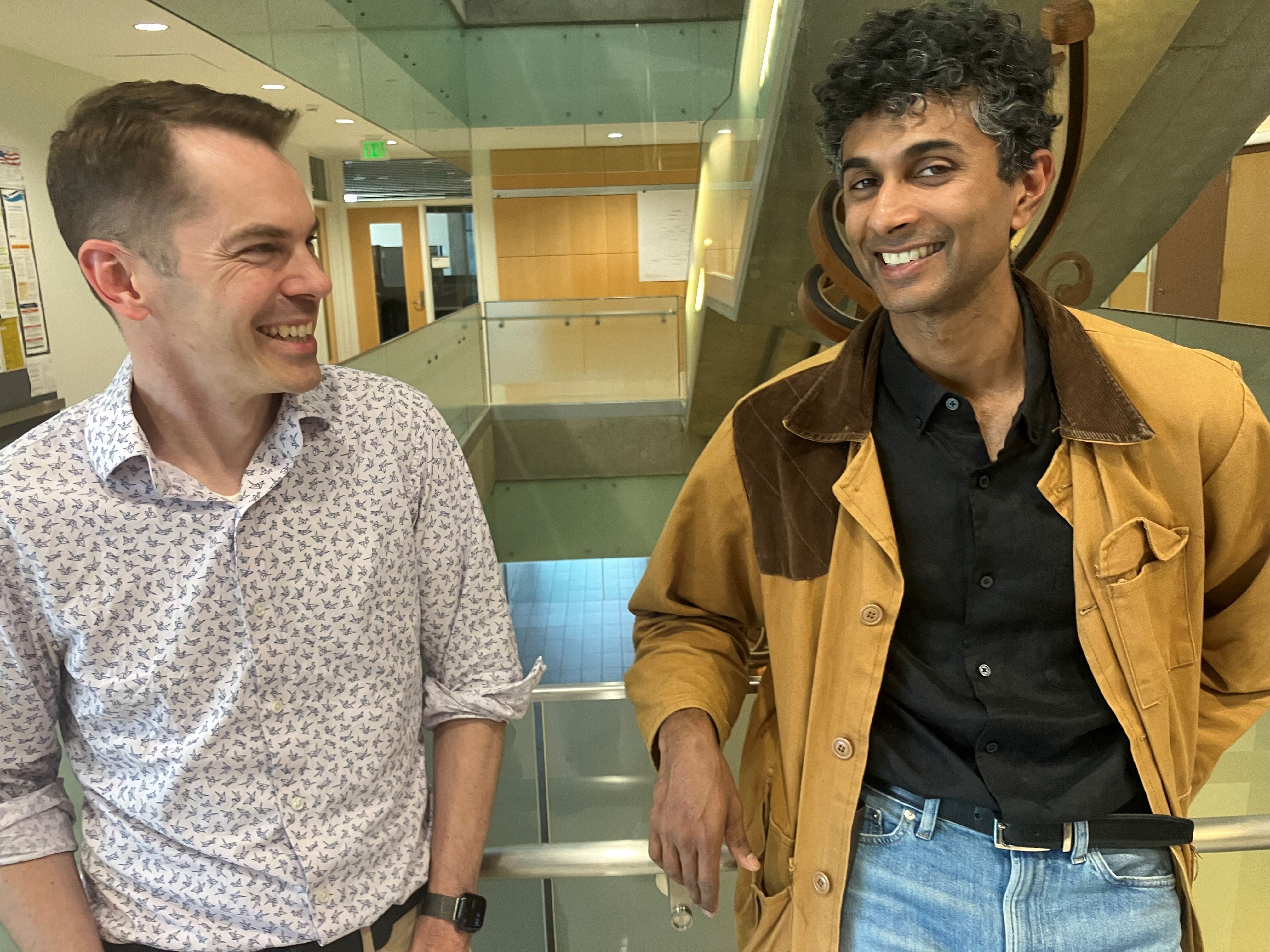 Sanjay Srivatsan (right) and BBI"s Cole Trapnell: '(Sanjay) engenders a great deal of trust, and in science trust is essential.'
Sanjay Srivatsan (right) and BBI"s Cole Trapnell: '(Sanjay) engenders a great deal of trust, and in science trust is essential.'
“I’m fascinated with how humans do things, how we build things, how we know the things we know, and how do we make this universe we live in. Science is one way to inquire about the aspects of life. But not the only way.”
These are profound words from a “medical school dropout.” But Sanjay Srivatsan, Ph.D., probably is unlike most medical school dropouts.
Srivatsan, 34, is an Assistant Professor in the Basic Sciences Division at the Fred Hutchinson Cancer Center and leads the Center’s Srivatsan Lab. A statement on the lab’s website summarizes its objective and, reading between the lines, Srivatsan’s scientific philosophy: “Our common call is that we are passionate and excited about discovering, building, and communicating the wonders of biology to the world. We also believe that our research can be a force for good in the world and that we have an obligation to conduct research accordingly.”
That passion and excitement started when Srivatsan was 13-years-old in the seventh grade in Stone Mountain, Georgia. His science teacher was discussing the Linnaean System of the classifying organisms.
“The idea that all these different living things could be organized and classified, and be related to their evolutionary path was extremely fascinating to me,” he said.
Five years and countless science fair demonstrations later, Srivatsan arrived on the campus of the University of California, Berkeley, “a massive public school that had everything.” He credits the opportunity to study at CAL to his parents and the financial sacrifice they paid in out-of-state tuition.
His declared major? Bioengineering. He was also pre-med.
“It was evident that computer science was foundational to biology, and the future would be building digital technology with science,” said Srivatsan, who as an undergrad, performed immunology research at Berkeley and Emory University in Atlanta. As a result, he completed a B.S. degree in Bioengineering and Biomedical Engineering in 2012.
He later enrolled in the University of Washington, still determined to pursue M.D. and Ph.D. degrees. It was during the COVID-19 pandemic, and after much reflection, he decided to forgo medical school.
“It was the biggest decision of my professional life,” he said. “I said to myself, ‘I’m going to choose to be a scientist and I’m going to cut this other part of my life away.’ I wanted to do one thing well, not two things in an average way.”
“Average” in no way reflects Srivatsan’s research in graduate school. Highlights include:
-
Leading the development of a protocol and method to massively scale single cell experiments, thereby increasing the number of these experiments that can be done simultaneously. See: https://www.science.org/doi/10.1126/science.aax6234
-
Devising a method to spatially transfer barcodes to tissues, so that spatial information could be recovered from sequencing data. See: https://www.science.org/doi/10.1126/science.abb9536
-
Testing and helping scale a COVID testing protocol, a key component of the UW’s Husky Coronavirus Testing program. See: https://academic.oup.com/clinchem/article/68/1/143/6323225
In June of 2021, Srivatsan completed his Ph.D. in Genome Science/Genomics, as well as a Doctorate in Philosophy. As one might expect, he almost immediately began working at the UW as a postdoctoral researcher with David Baker, Director of the Institute of Protein Design, as well as Cole Trapnell and Jay Shendure of the Brotman Baty Institute.
Trapnell believes Srivatsan is not just a researcher, but an engaging scientific leader.
“Sanjay is inspiring and he inspires others around him,” said Trapnell, who, like Shendure, continues to collaborate with Srivatsan. “When someone else does an amazing experiment, he’s the first one giving that person a high five. He punches way above his weight in a lab as a leader, because he’s not just very good, he makes everyone else better around him. And he does it so effortlessly. In addition, he engenders a great deal of trust, and in science trust is essential.”
Those characteristics are integral to Srivatsan’s current professional role at the Fred Hutchinson Cancer Center. After several interviews for faculty positions, his decision was between the Hutch and another research institute. He chose the Hutch for two reasons:
-
In Seattle, he has an “amazing community of friends and colleagues;” and
-
His parents relocated to Seattle to be close to Srivatsan and his wife.
“In my lab, I need dynamic young people who are willing to dream big,” he said. “The money will come if the work is good.”
Later, Srivatsan appeared to reflect on his lab’s mission that its research “can be a force for good in the world.”
“We are building this foundational layer that one day in the future we will change how the whole word looks,” he said. “We can educate people and we can discover things that make people’s lives better, like vaccines and COVID tests, but the longer vision is that we can reshape how the world is built and how it works.”


